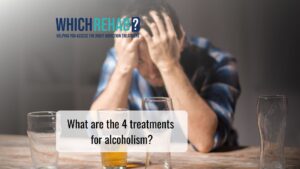Addiction is a serious problem that can take a toll on one’s physical and mental health. Seeking professional help is often the best way to overcome addiction. However, not everyone can afford private rehab treatment. So the question is, can you get rehab on the NHS?
The NHS is the publicly funded healthcare system in the UK. We’re fortunate in that it provides medical care and treatment to all UK citizens, regardless of their ability to pay. However, due to limited resources, not all treatments you can find in a private clinic are covered by the NHS.
In this article, we will explore whether the NHS provides rehab services and what options are available for people seeking help. We will also discuss the criteria for eligibility and give you some tips on how to access rehab on the NHS.

What do NHS rehabs offer?
NHS rehabs offer a range of services to those struggling with addiction and substance misuse, from drug misuse to alcohol addiction, to help them get back to everyday life. These services include detoxification, initial assessment, and treatment, as well as access to medical and psychological professionals who can provide a variety of therapies and interventions.
Medically assisted detox
Medically assisted detox is a clinically supervised process designed to help people overcome withdrawal symptoms when discontinuing the use of drugs or alcohol. This process involves the use of medications such as methadone and buprenorphine to manage cravings and alleviate withdrawal symptoms.
Inpatient detox is a treatment option where individuals receive around-the-clock medical supervision from specialised doctors and nurses in a hospital or residential facility. Outpatient detox, on the other hand, allows individuals to receive treatment during the day and return home at night. Both forms of detox have their advantages and disadvantages, and the choice of treatment depends on the severity of addiction, medical history, and individual preferences.
There are risks associated with medically assisted detox. Withdrawal symptoms can be severe and even life-threatening, which is why it is essential to seek medical supervision during the detox process. Also, substitute drugs used during detox, such as methadone and buprenorphine, can be addictive, and care must be taken to prevent dependency.

Addiction counselling
Addiction counselling is an essential part of the recovery journey for individuals struggling with behavioural to substance addiction, such as drug addictions. It provides a safe and supportive environment for individuals to talk about their struggles, emotions, and experiences related to addiction. Addiction counselling helps individuals to understand the underlying causes of their addiction, identify negative thought patterns and behaviours, and develop coping mechanisms to manage triggers and prevent relapse.
NHS rehabs offer different types of counselling, including group counselling and individual therapy. Group counselling provides individuals with the opportunity to engage with others in a similar situation and share experiences, challenges, and insights. It fosters a sense of community and belonging and encourages individuals to be accountable and responsible in their recovery journey.
Individual therapy, on the other hand, provides one-on-one support and guidance from occupational therapists. It allows individuals to delve deeper into their emotions, identify triggers, and develop strategies to cope with stressors. Nevertheless, waiting times for individual therapy can be long, and individuals might need to consider the potential delay when making decisions about their treatment.
Referrals to other community-led organisations
When seeking addiction support in the UK, it is important to consider accessing community-based organisations for assistance. The NHS recognises the value of community-led services and actively refers people to such organisations as a part of their addiction treatment plan.
Community-based organisations offer a variety of addiction support options, including group counselling, support groups, and access to addiction charities, such as Alcoholics Anonymous (AA) and UK SMART Recovery (UKSR). These organisations provide a safe and non-judgmental space for individuals to share their experiences and problems with others who understand what they are going through.

Free inpatient rehabs
Free inpatient drug and alcohol rehab are available through the UK’s National Health Service (NHS), albeit with certain limitations. Firstly, it is important to note that the NHS does not operate its own residential rehab clinics. However, the NHS does work with outside organisations that provide free addiction treatment services and facilities. These outside organisations offer various addiction treatments that range from detoxification to behavioural therapies such as cognitive behavioural therapy. Patients seeking help for their addiction can access these free inpatient rehabs through referrals from healthcare professionals or by contacting these organisations directly.
NHS funded rehabs
NHS-funded rehabs are one of the most commonly sought-after treatment options for individuals struggling with addiction issues in the UK. However, due to funding limitations and rigorous criteria, not everyone who seeks treatment may be eligible for residential addiction treatment through the NHS.
The NHS application process for residential addiction treatment is a thorough and rigorous one. Individuals seeking treatment are required to meet specific criteria related to their addiction issue. A detailed assessment is carried out to assess the patient’s eligibility for NHS-funded rehab. The criteria may be different depending on the area, but there is usually a set of guidelines to be followed, and patients are reviewed on a case-by-case basis.
Things to consider before applying to NHS rehabs
Before applying to an NHS rehab, there are important things that need to be considered. While accessing treatment through the NHS is a viable option, it is essential to understand the criteria for eligibility, the application process, the potential wait times, and the level of care that is offered. This article will provide insight into important factors to consider before deciding to pursue residential rehab through the NHS.
Waiting times
Accessing addiction treatment through the NHS can be a long and challenging process due to the high demand for services and limited government funding. With 275,896 adults in contact with drug and alcohol services between April 2020 and March 2021, the waiting times for treatment are often lengthy, leaving those struggling with addiction to wait for extended periods before receiving much-needed support.
It can take weeks or even months to access the appropriate level of care. This delay can be frustrating and discouraging, especially for those who are ready and motivated to begin their recovery journey.
The limited government funding for drug treatment further exacerbates this problem, as it means that addiction treatment services are unable to cater to the needs of everyone who requires their support.
It is crucial to be proactive in seeking treatment and preparing for the possibility of a long wait time. This can involve researching and exploring all available treatment options, engaging in self-help and support groups, and working with medical professionals to create a comprehensive care plan. It is also essential to prioritise self-care and actively work towards improving one’s mental and physical health while waiting for treatment.
The first step to any treatment is to talk to someone. The team at Which Rehab is ready to take your call, give you advice on the best treatment for your situation and get you the help you need.
Call free today on 0800 170 7000.

Lack of funding
The lack of funding for NHS rehab services has been a persistent issue for many years. The high demand for addiction treatment services and limited government funds mean that many individuals face lengthy waiting times when seeking support for their addiction recovery journey.
An important aspect to consider when seeking funding for rehab treatment is persistence. It can be a long and challenging process to secure NHS funding for rehab services, but persistence is key. You need to be proactive in seeking out all possible funding sources and advocating for your needs. This may include working with medical professionals and support groups to create a comprehensive care plan and applying for financial assistance programs.
Lack of choice
Lack of choice is a common issue faced by individuals seeking rehab treatment through the NHS. Due to limited options available, you may find yourself being placed into a treatment that does not consider your personal needs or preferences. This can lead to suboptimal outcomes and affect your recovery journey.
While lack of choice can pose challenges for individuals struggling with addiction and seeking rehabilitation treatment through the NHS, there are many alternatives available. By exploring self-help groups and other resources outside of the NHS, individuals can find the support they need to overcome addiction and achieve a better quality of life.
Tips for getting NHS Funding
If you are looking to get NHS funding for a rehabilitation program, there are several tips that can help you make your case.

1. Research the options:
The first step is to research all of the available treatments and programs that may be able to help you. You should also look into any specialized services or treatments that might be available in your area and accessible on the NHS.
2. Get your medical records in order:
You should make sure that you have all the necessary information about your medical history and current condition. This includes any test results, diagnosis reports, and other documents related to your treatment. Having everything organized will make it easier for you to present your case when applying for NHS funding.
3. Contact your GP:
Before making an application for NHS funding, you should set up an appointment with your GP to discuss your eligibility. Your GP can provide advice and guidance on the best course of action for your situation.
4. Speak to a rehab provider:
Rehab providers will be able to provide more information on the types of treatment available and what criteria must be met in order to qualify for NHS funding. At Which Rehab, we have all the experience needed to give you the best advice – call today.
5. Submit your application:
Once you have gathered all of the necessary information and documentation, it is time to submit your application for NHS funding. Submitting your application can be done through a variety of channels, including online portals, mailing in paper forms, or speaking with an administrator at your local NHS office. Once you have completed the application process, you will typically need to wait for a response from the NHS within two weeks.
How to get help today
If you or a loved one are struggling with addiction, finding the right treatment can be overwhelming and you might need help sooner than NHS rehabs are able to provide it.
Fortunately, here at Which Rehab, we offer a comprehensive directory of addiction support and alcohol services across the UK. In just a few clicks, you can search for treatment options that fit your specific needs, with access to experienced professionals, addiction counsellors, and a wide range of effective treatments.
Don’t wait to be on the road to recovery – get help today.
But if you’re looking to explore more, start by reading our article on the cost of rehab.







